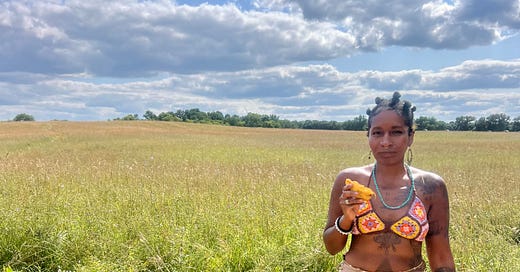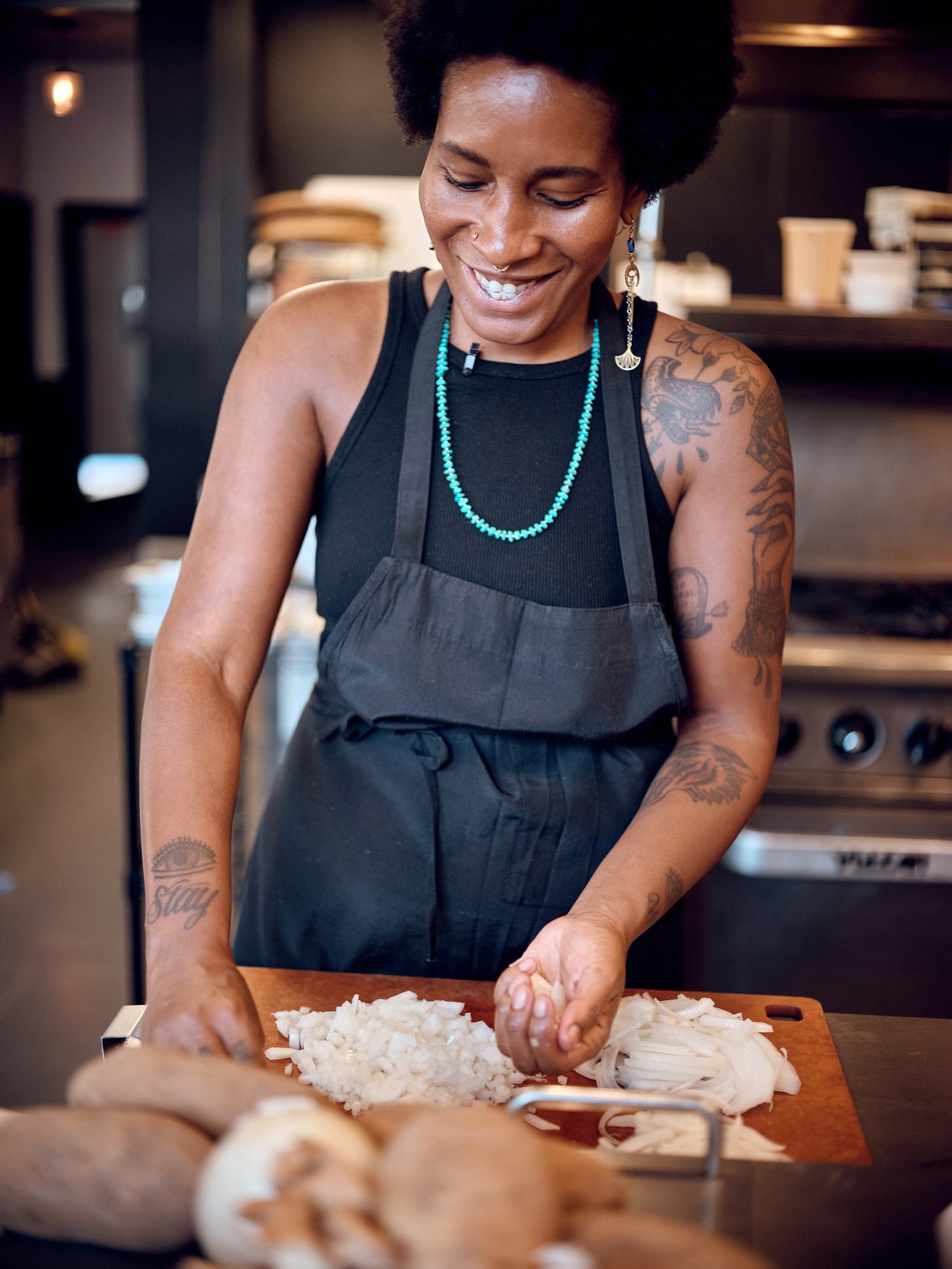“I’m most comfortable on a Ranger, with my afro, and probably Daisy Dukes. This is Trump country. And I’m Black!”
Sarah White is taking me for a ride on a borrowed four-wheeler, burning through 40 acres of Wisconsin farmland, gifted to her by an anonymous donor sometime between 2021 and 2022 (she says the period of time is a blur). A former cornfield, the now untended land is a thicket of prairie grasses and wildflowers– a sprawling beard of blonde whiskers punctuated tiny sunbursts of Birdsfoot Trefoil and lavender pinwheels of Chicory. The dragonflies and grasshoppers are actively trying to hitch a ride in every crevice of the vehicle. Sarah frantically brushes one that has alighted on her chest as she drives.
On the day I visit (she prefers to keep the name of the town private for her safety), her afro is wrapped into twists and she’s in a crochet bikini top instead of Daisy Dukes. But the vibe is the same: Black girl cruising, equal parts proud, and distressed about what comes next.
The idea that Black people should feel subversive or disconnected to farmland is an utterly ironic one. At the turn of the century, Black farmers were about proportional to the number of Black people in the country. Before emancipation, there would have been no better farmer than the Black farmer, who tended the plantations, fields for the big house, and gardens for their own survival. Naturally, white supremacy could not abide this fact, and Black people have been systematically stripped of their farmlands ever since.
There’s a small movement of Black farm collectives cropping up in the midwest, not far from Sarah’s land, but the numbers are still abysmally low– it’s estimated that there is a total of fewer than 40 Black farmers in Minnesota (out of more than 67,000 farms) and fewer than 75 in Wisconsin, out of more than 64,000 farms. Black farmers make up just over one percent of all farms in America.
At a hardware store in the area with some colleagues, Sarah recalls being asked if they were planning a murder.
“We’re farmers,” she deadpanned. She reports that cars regularly slow down to stop and stare when she’s in the area with friends.
While she does plan to grow food on the land, her vision is larger– a resting place for Black and Indigenous people to just go and be. Black mamas, queer folks, young ones, elders, and others needing refuge.
“A place to wildly grow medicine, food jungles, fire circles, sauna and cold plunge, star gazing, pleasure, health, relationships with animals, insects, and seasons.”
And this is important– you won’t have to fill out a form or an application to come, or write a report on what your experience was like when you leave— all vestiges of the bureaucracy that contribute to exhausting us in the first place— ironically attached to too many experiences like the one Sarah is envisioning. You don’t even have to help out when you’re there, though she says that would be nice.
As 2020 came and went, Sarah began noticing a disturbing trend.
“People that I was holding were becoming not OK, and some of them didn’t make it.”
Sarah is a healer, and her healing takes on many forms– as a massage therapist and touch healer, a sensuality doula, as a mother, a cook, a land steward, and in some cases, literally holding people.
“I hold people for a living,” she reiterates. She’s been told by many people that she’s the only place they feel safe.
And as the events of George Floyd’s murder and the global pandemic unfolded, and as we enter a second year of witnessing a genocide, Sarah’s clients became increasingly sick, physically and mentally, and she’s not seeing signs that it’s getting any better.
A cruise through Sarah’s Instagram tells you she’s deeply concerned with the sensual– oysters, truffle, body adornments, lingerie– she likes to cook in it; kittens, fresh flowers, a perfectly ripe mango. They’re touchstones that help thwart a violent world.
As a healer, she has seen too many people go past the point of repair.
“Some people are going really hard, and aren’t doing well. They are highly functioning in grief— we are watching genocide. I’m on a mission to get out of this cycle.”
The cycle: capitalism, grind culture, white supremacy, all of which are making people sick. It’s a poison soup we continue to spoon-feed ourselves until we hurt, but don’t know why.
Sarah offers a challenge: sit completely silently and still for a total of five minutes.
“Almost everyone notices some kind of physical or emotional pain they didn’t know that they had.”
Why?
“We aren’t in right relationship with anything,” she says as a matter of fact.
When she first received the land, Sarah was unsure. She didn’t sign the deed for two years, afraid that it would somehow be taken back– gifts like these don’t arrive every day, and she felt wary of it. Was this one of those short-timer 2020 reparations? And, she didn’t feel confident in her vision. Who was she to take on such a task?
On an early visit to the land, where she always makes an offering of tobacco or sage, as she asked herself this very question, she looked up and saw a single hawk circling over her. It felt like a sign. She named the space Hawk Communion to honor the moment.
Hawks typically travel in flocks for ease of travel, and once nested, they share the homes they create with other bird species. Psychics sometimes say a hawk appearance is a sign to trust one’s intuition.
Growing up in an intensely religious and cloistered household, Sarah rebelled early, running away at 16. Heavy metal and the streets followed– where she found community with other kids like her, and she found music as a form of protection and creative outlet. As she matured, she mellowed.
“I realized that my parents were just trying to protect me.”
Her mother, while strict, was not above using food as a salve in an otherwise demanding household, and Sarah recalls joyous moments in the kitchen with her and her mom’s friends, making fiery Trinidadian curry and handmade roti.
“I remember being in the kitchen with my mom and her friends and they were all just falling out [laughing].”
Both dishes require focused hand work, including measuring the seasonings for the curry– the formula is now in Sarah’s hands, and the hands of these women who came before her. There is no recipe– the recipe is in their legacy and oral histories. She regularly passes it all on to her teenage daughters in the kitchen, adding a massaged kale salad, a family favorite.
As a kid, her dad hunted and fished, and even 35 years ago, was unafraid of walking into rural stores to buy his bait and supplies.
“Getting minnows at these hick stores. People would be rolling their eyes at us, but he held his head up high.”
She says part of her effort with Hawk Communion is to reclaim the fear that we are all feeling as people of color after 2020.
“I want to hold my head up again.”
She shares a birthday with her dad– her mother had lost several pregnancies prior to Sarah, and her cervix had to be tied to keep the tiny Sarah inside. Her healthy birth felt divine to the family, and Sarah always seemed special. She would have dreams so lucid, her father didn’t like to come into the room afterwards because the energy felt so overwhelming. As a kid, she would stare at strangers on the bus until they became uncomfortable and had to avert their eyes.
“I might be a rabble rouser– somebody who shakes up spirit,” she says.
As we stood chatting at the edge of the land, a bottle of water I had been sipping on and set upon my truck hood began to vibrate and shake. I tried to explain it away as having something to do with the heat of the day. Sarah tried to remember what, exactly, she was speaking about when it happened– to take heed of the moment.
But creating a spiritual retreat takes time, and resources, and perhaps most of all, money. The money doesn’t come easily. Anyone who regularly applies for grants can attest to this, as Sarah does. She’s all but allergic to technology, and says that emails are triggering.
“I mean, I make people feel good.”
It’s her superpower. It should be enough. But we live in a society where it is not enough.
“There is a lot of pressure on me to not let this opportunity go to waste.”
The juxtaposition of her desire to just be with the land, relax on it, even lay down on it and sleep among the deer and the swallows and the dragonflies is in stark contrast to the amount of work there is to be done. She stands at the well she recently raised the funds to install. There is still work to be done on it. She has no idea how to do it.
Luckily, she’s been finding solace in grit. Meditation in ache.
“I create sanctuary in sauna and cold plunge. I push myself to the most discomfort, which has changed my life. I sit with the feeling that I’m not going to be OK, and see how much capacity I really have. I get to turn off all of the negative voices and go into my heart. It is my favorite, most grounding, most sanctuary part of my day.”
I point out the irony of her quest to create a place of solace and rest, while she pushes herself to the brink.
“I like the edges,” she shrugs. She may be soft, but also “defiant as fuck.”
In five years, she sees her communion as a living, existing thing. There will be hoop houses and eco-friendly structures to rest and sleep in. The junkyard behind a bank of trees that the land has been enduring for decades will be an earthship. The wetlands will be preserved. There will be Black people riding horses. The well will be finished.
“I’m going to have graying locks and a spliff sitting on a rocking chair with a shotgun behind me.”
I ask how shotgun aligns with a vision of a place for total calm and relaxation, she answers:
“There will be shotguns. We’re in the middle of Trumptown— we Black. But it’s going to be beautiful.”
Click here to donate to Hawk Communion.
And since nothing can be done alone, Sarah is looking for people with resources, skills, and knowledge to help.






Have you checked this out or spoken to the woman who’s initiated this yet on the north shore in Two Harbors MN? https://www.majiyachai.org/